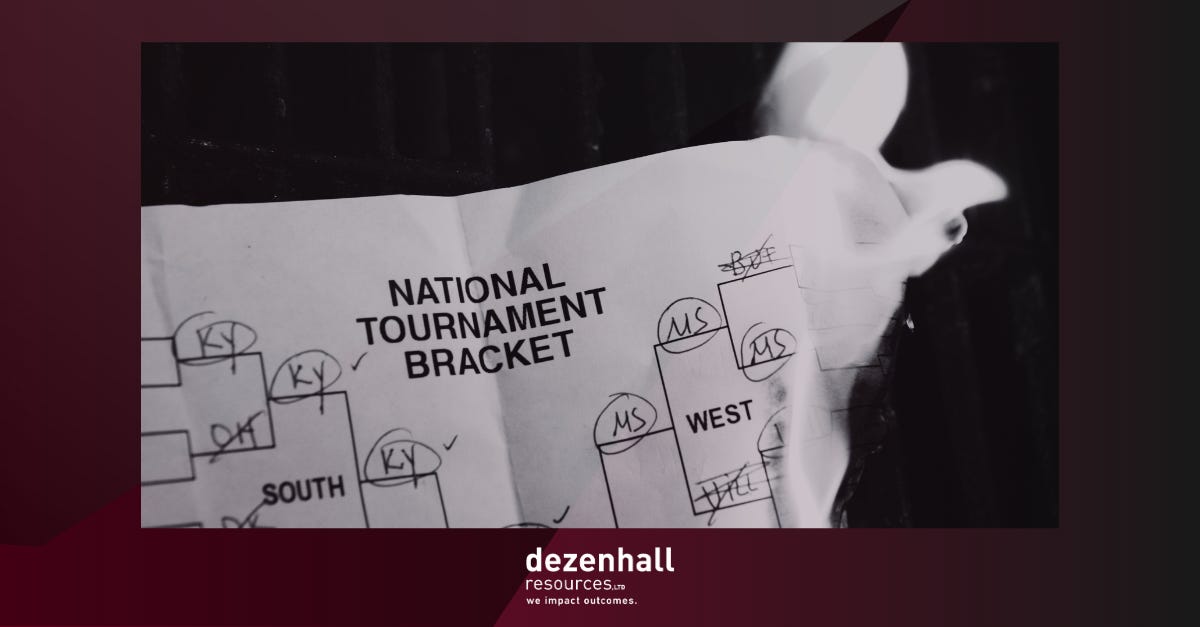Dez Reads. Deepfake Dangers, Park City’s Canine Conflict, Greener Sports Fields, Blocking Online Critics, and a Fashion Merger Faceoff.
Welcome to Dez Reads, where we examine recent trends in business, law, human interest, and more – giving you an insight into what Dez staff is reading, discussing, and debating.
This week, we dive into the frightening potential of deepfakes in sparking global conflicts. In Park City, a dispute involving two Bernese Mountain dogs unveils a new frontier in ultrawealthy NIMBYism. In sports, PE investment in natural stadium grass marks a shift into investable playing surfaces. On the social media front, new regulations are transforming how politicians engage online, pitting the First Amendment against the mental health of public figures. Meanwhile, the FTC’s effort to block a major fashion merger prompts questions about its impact on America’s competitiveness in the luxury goods market.
Each read provides a unique perspective on the challenges and transformations shaping public opinion and our daily media news cycles. Let’s dive into this week’s stories.
Here we go.

Legal.
The Hill. Humanity is one convincing deepfake away from a global catastrophe
From the article:
On Sept. 26, 1983, Russian Lt. Col. Stanislav Petrov declined to report to his superiors information he suspected to be false, which detailed an inbound U.S. nuclear strike. His inaction prevented a Russian retaliatory strike and the global nuclear exchange it would have precipitated. He thus saved billions of lives.
Today, the job of Petrov’s descendants is much harder, chiefly due to rapid advancements in artificial intelligence. Imagine a scenario where Petrov receives similar alarming news, but it is backed by hyper-realistic footage of missile launches and a slew of other audio-visual and text material portraying the details of the nuclear launch from the United States.
In my 64 years on earth, I’ve been through a lot of episodes of people essentially shouting, “The End is Nigh.” We were all going to die from chemicals, famine, nuclear war, a plague, dirty bombs, and my favorite: civil war. I’ve listened to all these doomsayers with skepticism and disinterest. The deepfake is the innovation that has me a little nervous. I am patiently awaiting expert analysis that tells me otherwise. In the meantime, I’ll default to believe the debunkers because it’s better for my sanity.
– Steven Schlein
WSJ. The Billionaire Dogfight Rocking Park City, Utah
Sasha and Mocha, two Bernese Mountain dogs belonging to Eric Hermann and Susan Fredston-Hermann, are public enemies 1 and 2 for billionaire Mathew Prince and his wife Tatianna.
The Princes are mired in an ongoing permitting dispute with their “mere millionaire” neighbors, aka Sasha and Mocha’s humans, over plans to build a new mansion in Park City. So, in the spirit of one-percenter NIMBYism, the Princes are hitting their neighbors where it hurts: dragging the dogs to court.
The lawsuit against pawfendants Sasha and Mocha alleges they’re aggressive, often off-leash, and left deposits 
While I appreciate the Princes’ self-awareness, he notes, “I get we’re rich assholes,” trying pups in the courtroom or the court of opinion is just bad karma, and all the humans involved should be in the doghouse.
– Anne Marie Malecha
USA TODAY. Which frequency are you on?
The death of OJ Simpson got me thinking about the best pundit line from his murder trial, which was an assessment of why the defense won. The analyst (whose name I don’t recall) said, “The prosecution was communicating on AM radio but the jury was receiving on FM.” This summarized the most important tenets of communication: human beings don’t think in terms of data and reason, we think emotionally and tribally. OJ was acquitted because the largely African American jury was understandably more persuaded by personally relevant experiences with racist cops than they were by the overwhelming evidence against OJ.
All of this explains our current political climate. There are no debates to be had. No facts to be presented. We stand where we stand because of who we are versus what we can learn. With the upcoming election, it’s now a play for points, getting people who already feel the way they do to vote — or not vote — in the places that matter.
– Eric Dezenhall
Sports.
NYT. Will the grass be greener?
Bruin Capital, the sports-focused private equity firm run by former NASCAR COO George Pyne, is taking a unique approach to get a piece of the live sports pie by making a bid for the Netherlands-based company PlayGreen, according to the NYT. The company specializes in growing and maintaining stadium natural grass.
PlayGreen first came onto the scene in 2004 by inking a deal with Arsenal FC, but it has since expanded into the NFL, Wimbledon, The Masters, and horse racing. With TV rights and all things live sports continuing to heat up and fetch higher price tags (more on that below), this acquisition hopes to buck the trend of sports teams opting for artificial turf over grass. Natural grass continues to grow in popularity, and more professional athletes continue to blame turf for season-ending injuries. As with all things, there is an AI angle here, too – the company says that they intend to introduce AI to help automate turf management based on the data they collect.
– Mike Bova
The ongoing fashion controversies at Nike are not just a matter of style but a significant concern for the sports community. Since its debut in 2023, the updated Major League Baseball uniform has been the subject of harsh criticism from fans and players alike. The complaints range from split seams to sweat stains and even see-through pants. In an internal memo, the Major League Players Association states, “This has been entirely a Nike issue,” the memo to players said. “At its core, what has happened here is that Nike was innovating something that didn’t need to be innovated.”
It’s becoming a pattern at Nike—making changes for changes’ sake, like their reimagining of the design of the England soccer team’s new kits for the UEFA Euro 2024 tournament, which featured a modified St. George’s Cross.
– Jen Hirshon
Social Media.
AXIOS. Scoop: House members warned not to block online critics
It’s easy to forget that influencers – online and IRL – are people, too. They have families and friends; they laugh and they cry; they drink beer and they watch reality TV. I am not an influencer by any means, but I have gone (baby) viral a few times on a few different platforms. I’ve also managed social media accounts with a lotttt of followers. Commenters can be delusional and unnecessarily cruel.
Guidance last week from the House of Representatives’ general counsel states that Members of Congress should “rarely, if ever” block commenters online. In my view, this is good for the First Amendment but bad for mental health. In conversations I have had with elected officials about their social media activity over the years, I’ve learned that the vast majority don’t look at their comments, that it’s bad for their mental health, and that it is legitimately scary when people threaten or dox them or their families.
I’m glad this rule is only for the official accounts – I guess it’s important that voters (even if they’re Internet trolls) are able to keep up to date with legislation, political stances, and rulings that affect their lives, but I hope more influencers, political or not, will encourage civil discourse and lead with tolerance for other beliefs, as opposed to preaching tolerance and then attacking their neighbor for their otherness.
– Annie Moore
Business.
NYT. FTC Sues to Block $8.5 Billion Fashion Merger
Antitrust is priority number one of FTC Chair Lina Khan, so an attempt to block a merger is not particularly surprising. However, what is surprising is an attempt to interfere in the Capri-Tapestry merger, in an industry where competition for consumers is plentiful and the companies looking to merge reflect a relatively small market share, especially in comparison to European fashion brands.
Europe has long been ahead of the US in terms of fashion and luxury goods. LVMH, the parent company of Louis Vuitton, had revenue of $92.2 billion in 2023. The combined revenue for Capri, which owns Versace and Jimmy Choo, and Tapestry, which owns Kate Spade and Stuart Weitzman, was $12 billion.
Fashion and Lina Khan may not be at the top of mind when thinking about populism and isolationism. Still, I can’t help but wonder if this type of government intervention is hurting America’s ability to compete globally.
– Anne Marie Malecha


